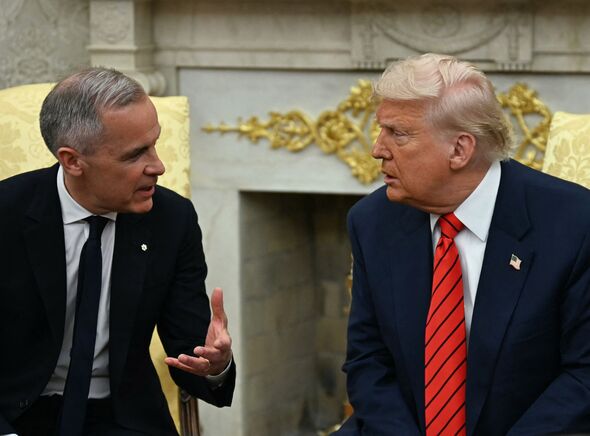A significant diplomatic rift has emerged between the United States and Canada, ignited by former President Donald Trump’s strong condemnation of Ottawa’s decision to recognize a Palestinian state. This contentious move by Canada, following similar declarations from other prominent Western nations, has prompted a stern warning from Trump regarding potential repercussions on crucial trade agreements, signaling a volatile new chapter in international relations and US foreign policy.
Canada’s announcement marks a pivotal moment, positioning it as the third Western country within a week to signal its intention to formally recognize a Palestinian state. This aligns with increasing global pressure on international leaders to address the escalating humanitarian crisis in Gaza and work towards a resolution in the enduring Israeli-Palestinian conflict. Canadian Prime Minister Mark Carney’s statement indicates this recognition could occur as early as September.
The severity of Trump’s stance is underscored by a looming deadline for Canada regarding a trade deal with the US. He explicitly stated that Canada’s backing of Palestine statehood would complicate future US trade negotiations, potentially leading to significant economic penalties. Without a new agreement by Thursday, Canada faces the prospect of a substantial 35 percent tariff on most goods exported to the United States from Friday onwards.
Echoing his prior unfiltered commentary, Donald Trump articulated his displeasure directly on Truth Social. “Wow! Canada has just announced that it is backing statehood for Palestine,” Trump posted. “That will make it very hard for us to make a Trade Deal with them. Oh Canada!!!” This public rebuke highlights the deep political divisions and the sensitive nature of the topic.
The geopolitical landscape is clearly shifting, with Canada’s move not in isolation but as part of a broader trend. Both France and the United Kingdom have recently announced their intentions to recognize a Palestinian state, signifying a unified push from key European powers. This collective diplomatic action adds considerable weight to the international calls for a two-state solution and increased humanitarian intervention.
Further emphasizing this global shift, UK Prime Minister Keir Starmer recently declared Britain’s commitment to recognizing a state of Palestine. He indicated this could happen before the UN General Assembly in September, contingent on Israel ceasing “the appalling situation in Gaza” and agreeing to an immediate ceasefire. These statements underscore a growing international consensus on the urgency of the matter.
The potential economic fallout from Donald Trump’s threat could significantly reshape US-Canada relations, impacting trade flows and diplomatic ties. Such a development would not only affect bilateral commerce but also send ripples through global markets, given the extensive economic interdependence between the two nations. This adds a layer of economic risk to an already complex geopolitical situation.
This series of events, where key Western nations are openly advocating for Palestine statehood, signals a profound re-evaluation of the Israeli-Palestinian conflict on the international stage. It suggests a potential departure from traditional diplomatic approaches and an increased willingness by countries to take independent stances, even when it risks friction with allies like the United States. This evolving international relations dynamic holds significant implications for future peace efforts.
The escalating pressure on global leaders to act decisively amid the humanitarian crisis in Gaza is undeniable. The coordinated efforts by Canada, France, and the UK to recognize a Palestinian state reflect a growing international impatience and a demand for more concrete steps towards a lasting resolution. The confluence of these diplomatic maneuvers and economic threats from figures like Donald Trump creates an unpredictable and critical period for international diplomacy and the Middle East.






Leave a Reply